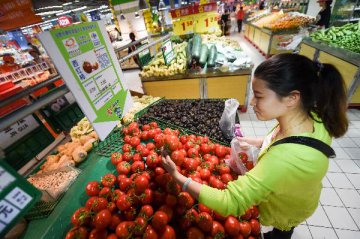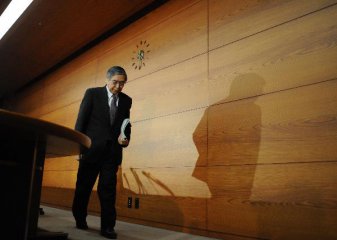Consumer price index stood at 104.87 in November, up 0.2 percent from a year earlier, according to Statistics Korea. It was the first increase in four months since July.
The consumer price inflation was unchanged in August and October, marking the first-ever decline in September. It hovered below 1 percent for 11 straight months.
Price for agricultural, livestock and fishery products dipped 2.7 percent in November from a year earlier, after sliding 3.8 percent in the previous month.
Agricultural product price contracted 5.8 percent in the month, pulling down the overall inflation by 0.25 percentage points.
Prices for potato, garlic, tomato and powdered red pepper dived in double figures, but those for white radish, napa cabbage and cucumber advanced in double digits.
Prices for livestock and fishery products increased 1.0 percent and 1.2 percent each last month.
Oil product price slumped 4.8 percent amid the cheaper global crude oil, but the falling pace slowed down from a decline of 7.8 percent in October.
The cheaper oil product dragged down the overall inflation by 0.22 percentage points. Prices for gasoline and diesel retreated 4.2 percent and 4.1 percent respectively.
Fresh food price index, which gauges costs for fish, shellfish, vegetable and fruit, diminished 5.3 percent in November on a yearly basis, keeping a downward trend for the fifth consecutive month.
The so-called livelihood cost, which reflects cost for daily necessities, inched up 0.2 percent in the month.
Price for electricity, tap water and natural gas gained 1.5 percent in November from a year earlier.
Services price rose 0.7 percent last month. Private services cost advanced 1.6 percent, pulling up the overall inflation by 0.52 percentage points.
Public services price declined 0.9 percent on the government’s welfare and education policies that led to a double-digit decline in school meal cost and high school tuition fees.
Medical checkup costs and mobile phone bills reduced in single digits, but taxi and bus fares as well as apartment service charges gained last month.
Meanwhile, core consumer price, which excludes volatile agricultural and oil products, rose 0.6 percent in November from a year earlier, posting the lowest in about 20 years.
The OECD-method core price, which excludes volatile food and energy costs, added 0.5 percent in the month.
Amid the low inflationary pressure, the Bank of Korea (BOK) lowered its benchmark interest rate by 25 basis points to a record low of 1.25 percent in October, just three months after cutting it from 1.75 percent to 1.50 percent.
The BOK froze its target rate last week at the record-low level, but one of the seven monetary policy board members claimed a further rate cut, indicating a more accommodative monetary policy next year.




















Latest comments